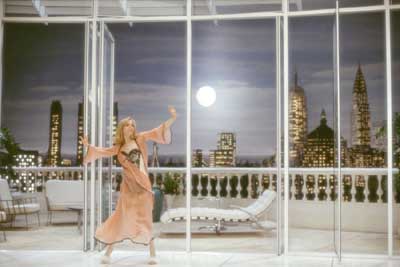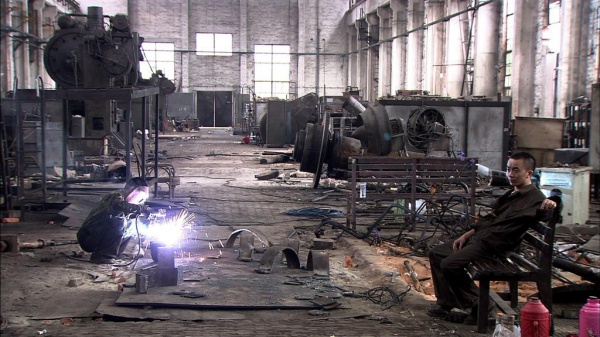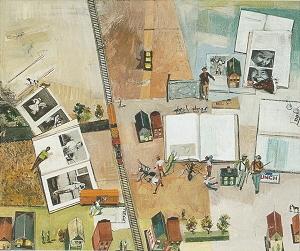Written for The Unquiet American: Transgressive Comedies from the U.S., a catalogue/ collection put together to accompany a film series at the Austrian Filmmuseum and the Viennale in Autumn 2009. — J.R.

One reason I took so long getting to see this movie (2003) was the number of friends who assured me it was nothing special. Most of them seemed to go along uncritically with the publicists’ claim, echoed by reviewers, that it was a simple point-by-point pastiche of three late-50s and early-60s comedies starring Rock Hudson, Doris Day, and Tony Randall: Pillow Talk (1959), Lover Come Back (1961), and Send Me No Flowers (1964). These films have never appealed to me in the slightest, though Mark Rappaport did an expert job of unpacking them in his 1992 Rock Hudson’s Home Movies. But Down With Love is also an affectionate satire of late-50s and early-60s studio glitz that often contradicts the pastiche. The filmmakers, who were too young to experience this era themselves, make plenty of errors, starting with a Fox CinemaScope logo (wrong studio and too late for that logo) and the snazzy rainbow credits (too hyperactive for the time). Then we get palatial Manhattan apartments (much more identified with How to Marry a Millionaire in 1953 and The Tender Trap in 1955) and bubble-gum-colored media blitzes (as in Funny Face and Will Success Spoil Rock Hunter? Read more
An essay written for the Cinema Guild’s DVD, released in 2009. — J.R.

24 City is a documentary about the transformation of Factory 420 in
Chengdu from the secret manufacture of military aircraft engines in 1958
to, after the Vietnam War, a downsized and remodeled facility producing
consumer products, and then, more recently, into a privately owned
real-estate development called “24 City”. This sounds pretty
straightforward, but because it’s a Jia Zhangke film, it qualifies as an
adequate description only in the most skeletal fashion. Factory 420
employed almost 30,000 workers, so a lot of life experience and
displacement is involved in this multifaceted story — a good half-
century of Chinese history. And Jia is so desperate to discover the
truth of his subject that he’s willing to employ anything and
everything, including artifice, if this will bring him any closer
to what urban renewal is the process of quickly obliterating.
The theme of his film — of all his features to date, in fact — is
the displacement coming from historical upheavals in China
and the various kinds of havoc they produce: physical, emotional,
intellectual, political, conceptual, cultural, economic, familial,
societal. And sometimes the style involves a certain amount of
displacement as well, such as when he cuts from a speech in late
2007 about recent changes in “24 City” before a full audience in
an auditorium to a shot of an almost empty stairway that plays
over the same speech, with one figure climbing the steps on two
successive floors. Read more
I’m reposting this as a sort of adjunct to David Bordwell’s excellent two-part study of Manny Farber (available here and here). My relatively recent review of Farber on Film can be accessed here.
This very personal essay was written in 1993 for my first collection, Placing Movies: The Practice of Film Criticism. I’ve updated a few facts, all placed in square brackets, and corrected some typos, including one that appeared on the first page of the essay in the book, much to my irritation (as well as Manny’s) ….The photograph at the very end of this piece, before the new Afterword, taken by Andy Rector, shows Manny and Patricia with Gabe Klinger. — J.R.

They Drive by Night: The Criticism of Manny Farber
By Jonathan Rosenbaum

“What is the role of evaluation in your critical work?” Manny Farber was once asked in an interview. “It’s practically worthless for a critic,” Farber replied. “The last thing I want to know is whether you like it or not; the problems of writing are after that. I don’t think it has any importance; it’s one of those derelict appendages of criticism. Criticism has nothing to do with hierarchies.” A few years later, in another interview — published in French, so I can’t quote from it verbatim — he expressed his irritation with Pauline Kael writing about RAGING BULL as if she knew what was good or bad in every shot, in every scene. Read more




